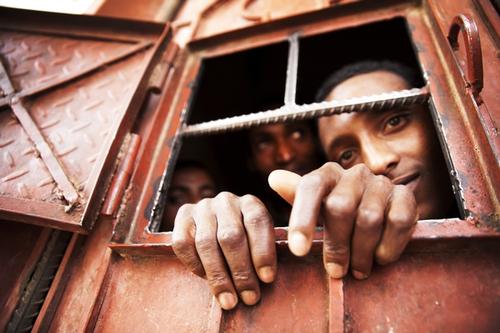Countless migrants, mainly Ethiopians, pass through the country on their way to Saudi Arabia; many become victims of torture at the hands of human traffickers
"We arrived in Yemen at midnight. We got off the boat and as we had heard stories of traffickers, we hid on a small mountain. The next day, we tried to get some food. We met an older man and his camel. He told us that he was getting us something to eat, but he sold us to traffickers." says Jemale, a 20-year-old Ethiopian who left his home four months ago in search of opportunities in Saudi Arabia. "We arrived at a compound where there were eight people and all of them were terrified. We were told that if we couldn't arrange for someone to send money, they would hurt us. I tried to explain that I was poor. I watched as they began to burn a piece of metal in the fire and they used it to burn my leg."
Jemale is currently in the detention centre for migrants in Sana'a, the capital of Yemen. He managed to escape from the traffickers; one of his friends was shot in the leg during the escape and Jemale doesn't know what happened to him. Afterwards, he spent days hiding in the mountains without food or water. At that point he decided to undertake the journey back. It took 12 days to reach Sana'a, where he lived in the entrance of the Yemen migration office for a month before he was finally able to get into the centre. "I lived with my parents and my 10 brothers and sisters in Ethiopia. I finished school and didn't have a job. We all decided that I would make this trip. I ran out of money before I got to Yemen so I told the traffickers that I did not have a mother so that they would not have to pay for my release."
This story is repeated throughout the centre. Yemen is a country of transit for the thousands of migrants who leave the Horn of Africa to try to get to the countries of the Arabian Peninsula, mainly from Ethiopia to Saudi Arabia. During the trip and especially in Yemen, these people are victims of traffickers who extort money from them and torture them. Last April, the Yemeni authorities carried out a campaign to release hundreds of migrants held by traffickers and begin to repatriate them to their home countries. Since then, the number of migrants who voluntarily approach the centre seeking repatriation has greatly increased.
In the Sana'a detention centre, the living conditions are precarious. With a maximum capacity of just 250 people, the centre currently houses about 750. Migrants are locked up in large cells for most of the day. Several organisations, including the International Organization for Migration (IOM) and the Yemeni Red Cross, give them medical care and food. Médecins Sans Frontières (MSF) has been running a mental healthcare programme at the centre since May.
"The migrants who arrive at the centre are very traumatised; some of them haven’t eaten for days or even weeks,” explains Esperanza Leal, an MSF psychologist working in the detention centre. “We create active listening spaces. We explain that these are normal reactions to the traumatic experiences that they have been through. There are many cases of post-traumatic stress disorder and severe depression. But the essential focus of the intervention is very much related to recovering dignity, reminding them that they are individuals with the right to social recognition.”
...the essential focus of the intervention is very much related to recovering dignity, reminding them that they are individuals with the right to social recognition.Esperanza Leal, a MSF psychologist
The return home
Because the vast majority of migrants are Ethiopian, representatives from the Ethiopian embassy visit the detention centre once a week to prepare the necessary documents for repatriation. According to Yemeni authorities, about 4,000 migrants have been repatriated to their countries of origin since April.
"Just to deport the migrants who are in Yemen would take us a long time. For example, near the border with Saudi Arabia it is estimated that there are nearly 30,000 Ethiopian migrants trying to cross the border, and there are more at other sites," says Abdullah Al zurqah, Yemen's general director of migration and deportation. "Our country needs a huge amount of support on this issue, because migrants are arriving at Yemen's coastline almost every day".
Awel worked as a teacher, journalist, translator and businessman in Ethiopia. When he lost his job, he decided to try his luck in another country, like several of his brothers and sisters who live abroad. His mother gave him a little money for the trip, but it ran out before leaving Ethiopia, so he made most of the journey on foot. From Ethiopia he went to Somaliland and then to Djibouti. He begged and tried to work to continue his journey. "To those who are thinking of leaving Ethiopia or who have already left, I tell them this is a road to death," he explains.
In Yemen, he was cruelly tortured for 17 days. On his birthday, he decided that he would escape or die. Finally, he succeeded. A Yemeni family tended to his wounds and helped him for part of the journey. He arrived in Sana'a and after 17 days living poorly outside the centre, he could enter. "It is very difficult to come to Saudi Arabia and if you do succeed, the police or the Saudi soldiers send you back to Yemen so you are in the same situation. There is no need. I advise those who are thinking of emigration that it is better to remain at home than to be slave, this is slavery. This really is slavery, modern slavery".



